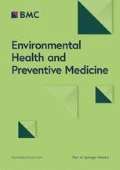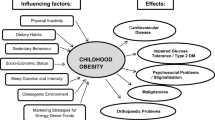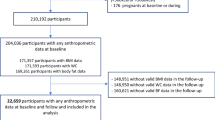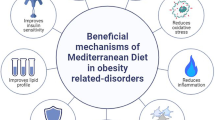Abstract
Objective
This study aimed to highlight nutritional status, dietary habits and sedentary patterns among university students in Khartoum state, Sudan.
Methods
A cross-sectional survey was carried out among 400 university students (183 males and 217 females) from University of Khartoum, Sudan. A pre-validated self-reported questionnaire was used to collect the data. Weight and height were measured and body mass index was used to determine obesity status.
Results
Of the students, 20.5, 14.7, and 1.7 % were underweight, overweight and obese, respectively. The majority of students (85.5 %) consumed breakfast daily. About 45 and 21.8 % of students consumed vegetables and fruit, respectively, on more than 3 days a week. Fast food was consumed significantly more (p < 0.01) for more than 3 days per week by females (44.2 %) than males (27.3 %). Females (42.9 %) were more likely to watch television for 3 h and more per day than males (30.6 %) (p < 0.039). Males (33.9 %) were more prone to sleep for fewer than 7 h per day than females (23 %) (p < 0.016).
Conclusion
The health authority in Sudan should not only focus on prevention of malnutrition among children but also should organize programs to promote healthy eating and lifestyle among children and youths to prevent and control alarming risk factors for chronic diseases.
Similar content being viewed by others
References
Amuna P, Zotor FB. Epidemiological and nutrition transition in developing countries: impact on health and development. Proc Nutr Soc. 2008;67:82–90.
Nagwa MA, Elhussein AM, Azza M, Abdulhadi IVH. Alarming high prevalence of overweight/obesity among Sudanese children. Eur J Clin Nutr. 2011;65:409–11.
Musaiger AO, Al-Hazzaa HM. Prevalence and risk factors associated with nutrition-related non-communicable diseases in the Eastern Mediterranean region. Int J Gen Med. 2010;5:199–217.
Edmonds MJ, Ferreira KJ, Nikiforuk EA, Finnic AK, Leavey SH, Duncan AM, Randall-Simpson JA. Body weight and percent body fat increase during the transition from high school to university in females. J Am Diet Assoc. 2008;108:1033–7.
Pullman AW, Masters RC, Zalot LC, Carde LE, Saraiva MM, Dam YY, Randall-Simpson JA, Duncan AM. Effect of transition from high school to university on anthropometric and lifestyle variables in males. Appl Physiol Nutr Metab. 2009;34:162–71.
Zarei M, Moh-Taib MN, Zarei F, Abu-Saad H. Factors associated with body weight status of Iranian postgraduate students in University of Putra Malaysia. Nurs Midwifery Stud. 2013;2:97–102.
Martinez-Alvarez JR, Garcia-Alcon R, Villarino-Marin A, Marrodan-Serrano MD, Serrano-Morago L. Eating habits and preferences among student population of the Complutense University of Madrid. Public Health Nutr. 2015;18:2654–9.
Food and Agriculture Organization (FAO). Nutrition country profile republic of Sudan, 2005.
Global Nutrition Report. Nutrition country profile, Sudan, 2014. http://www.globalnutritionreport.org.
Southern Sudan Center for Census Statistics and Evaluation. Food and nutrition security assessment in Sudan, Juba, Southern Sudan, 2010. http://www.sscce.org.
Musaiger AO, Bader Z, Al-Roomi K, D’Souza R. Dietary and Lifestyle habits amongst adolescents in Bahrain. Food Nutr Res. 2011;. doi:10.3402/fnr.v5510.7122.
Lee RD, Nieman DC. Nutritional assessment. 5th ed. New York: McGraw Hill; 2010.
World Health Organization (WHO). Obesity: preventing and managing the global epidemic. WHO Technical Report Series No. 894. Geneva, Switzerland. 2000.
Gunes FE, Bekiroglu N, Imeryuz N, Agirbasli M. Relation between eating habits and a high body mass index among freshman students: a cross-sectional study. J Am Coll Nutr. 2012;31:167–74.
Musaiger AO, Hammad SS, Tayyem RF, Qatatsheh AA. Socio-demographic and dietary factors associated with obesity among female university students in Jordan. Int J Adolesc Med Health. 2014;. doi:10.1515/Ijamh-2014.
Yahia N, Achkara A, Abdalla A, Rizk S. Eating habits and obesity among Lebanese university students. Nutr J. 2008;. doi:10.1186/1475-2891-7-32.
Al-Rethaiaa AS, Fahmy AE, Al-Shwaiyat NM. Obesity and eating habits among college students in Saudi Arabia: a cross-sectional study. Nutr J. 2010;. doi:10.1186/1475-2891-9-39.
Kerver JM, Yang EJ, Obayashi S, Bianchi L, Song WO. Meal and snack patterns are associated with dietary intake of energy and nutrients in US adults. J Am Diet Assoc. 2006;106:46–53.
Ackuaku-Dogbe EM, Abaidoo B. Breakfast eating habits among medical students. Ghana Med J. 2014;48:66–70.
Rasheed P, Al-kunji AA, Al-Saffar BM, Al-AbdulKarim HM, Al-Thawadi MI. Are young Arab women eating a healthy diet? A qualitative dietary study among college hostel students. J Fam Community Med. 1999;6:17–22.
Timlin MT, Pereira MA. Breakfast frequency and quality in the etiology of adult obesity and chronic diseases. Nutr Rev. 2007;65:268–81.
Purslow LR, Sandhu MS, Forouhi N, Young EH, Luben RN, et al. Energy intake at breakfast and weight change: prospective study of 6,764 middle-aged men and women. Am J Epidemiol. 2008;67:188–92.
Bellisle F. Meals and snacking, diet quality and energy balance. Physical Behav. 2014;134:38–43. doi:10.1016/j.physbeh.2014.03.010.
Musaiger AO, Takruri HR, Hassan AS, Abu-Tarboush H. Food-based dietary guidelines for the Arab Gulf countries. J Nutr Metab. 2012;. doi:10.1155/2012/905303.
Peltzer k, Pengpid S. Correlates of healthy fruit and vegetables diet in students in low, middle and high income countries. Int J Public Health. 2015;60:79–90.
Musaiger AO. Unhealthy eating habits, physical inactivity and sedentary behaviors among Arab adolescents: the Main risk factors for chronic diseases. ASPETAR J. 2016 (in press).
El-Ghazali S, Ibrahim JM, Kandari BM, Ismail NA. The relationship between lifestyle and body mass index among university students in Kuwait. Egypt J Comm Med. 2010;28:69–76.
Shah T, Purohit G, Nair SP, Patel B, Rawal Y, Shah RM. Assessment of obesity, overweight and its association with the fast food consumption in medical students. J Clin Diagn Res. 2014;8:CC05–7. doi:10.7860/JCOR/2014/7908.4351.
Virtanen M, Kirimaki H, Ervasti J, Oksanen T, Peritti J, Kouvonen A, et al. Fast-food outlets and grocery stores near school and adolescents’ eating habits and overweight in Finland. Eur J Public Health. 2015;25:650–5.
Martins ML, Kac G, Silva RA, Bettiol H, Barbieri MA, Cardoso VC, Silva AA. Dairy consumption is associated with lower prevalence of metabolic syndrome among young adults from Ribeirao preto, Brazil. Nutrition. 2015;31:716–21. doi:10.1016/j.nut.2014.12.017.
Lim L, Banwell C, Bain C, Banks E, Seubman SA, Kelly M, Yiengprugswan V, Sleigh A. Sugar sweetened beverages and weight gain over 4 years in a Thai national cohort––a prospective analysis. PLOS One. 2014;9:e95309. doi:10.1371/journal.pone.DD95309.
Benline KS, Kamody RC, Thurston JB, Banks GG, Rybak TM, Ferry RT. Physical activity, sedentary behaviors, and nutrition risks profiles and relations to body mass index obesity and overweight in Eighth grade. Behav Med. 2016 (in press).
American Academy of Pediatrics. Committee on public education; children, adolescent and television. Pediatrics. 2001;107:423–6.
Cappuccio FP, Taggart FM, Kandala NB, Curric A, Stranges S, Miller MA. Meta-analysis of short sleep duration and obesity in children and adults. Sleep. 2008;31:619–26.
Author information
Authors and Affiliations
Corresponding author
Ethics declarations
Conflict of interest
The authors declare no conflict of interest.
Rights and permissions
About this article
Cite this article
Musaiger, A.O., Al-Khalifa, F. & Al-Mannai, M. Obesity, unhealthy dietary habits and sedentary behaviors among university students in Sudan: growing risks for chronic diseases in a poor country. Environ Health Prev Med 21, 224–230 (2016). https://doi.org/10.1007/s12199-016-0515-5
Received:
Accepted:
Published:
Issue Date:
DOI: https://doi.org/10.1007/s12199-016-0515-5




